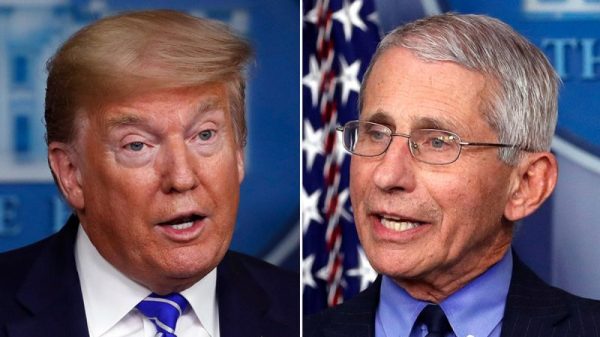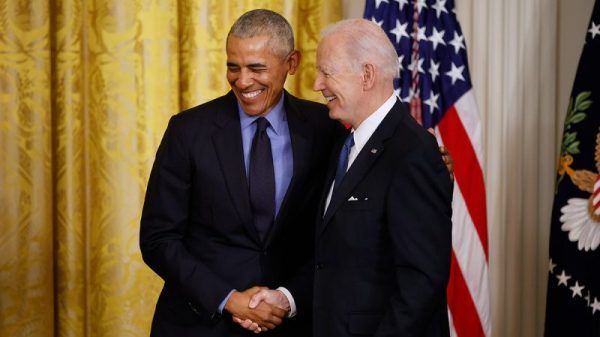The 2024 election could well hinge on whether Donald Trump is convicted of a crime next year. That’s if the polls are to be believed — and if people are being honest with pollsters and themselves.
A variety of polls have tested this question, and virtually every one of them indicates that a huge number of Trump backers would stick with him even if he is a felon. But they also show that a conviction could turn off a group of voters that is significant enough to effectively lose the race for Trump.
They also offer disparate findings about how much a conviction might matter, reinforcing how uncertain the actual impact would be.
A New York Times/Siena College poll last month got the ball rolling on this hypothetical. The swing-state poll showed Trump going from a four-point lead on Biden across those states to a 10-point deficit if he’s convicted — a massive 14-point swing on the margins. If the impact were even close to that, it would be likely to foreclose any real shot Trump had.
Other pollsters have now increasingly tested versions of this question, too, and the findings vary significantly:
A Reuters/Ipsos poll this week showed an even bigger impact. While Trump led Biden within the margin of error in a field including independent Robert F. Kennedy Jr., taking 38 percent, just 25 percent said they would vote for Trump if he were convicted of a felony by a jury. Fifty-nine percent of voters overall and 31 percent of Republicans said they wouldn’t back him — numbers that would in all likelihood be prohibitive for him.A Vanderbilt University poll of Tennessee voters this week showed Trump’s support dropping from 45 percent without a conviction to 37 percent with one. That wouldn’t be enough to put the red state in play — and it is notable that his supporters mostly went to candidates other than Biden — but such a shift would be likely to be decisive if reflected across other states.A Quinnipiac University poll last month showed a more muted impact. Trump took 38 percent in that poll and led Biden by three points, but only 84 percent of his supporters were committed to backing him if he were convicted. That would move his support down to 32 percent.A Wall Street Journal poll over the weekend featured the most muted impact of all. It showed Trump leading by four points without a conviction and trailing by one if convicted.
These polls asked the question in different ways, but we can more or less measure how the issue affects Trump’s margin in each. The margin swing against Trump is 14 points in the Times/Siena swing-state poll, double-digits in the Reuters/Ipsos poll (which didn’t retest the overall ballot), at least six points in the Quinnipiac poll (which also didn’t retest the ballot), six points in the Vanderbilt Tennessee poll, and five points in the Wall Street Journal poll.
Even those smaller shifts could matter, though. After all, only one presidential election in the 21st century has featured a popular-vote margin larger than 4.5 points. And although Trump leads nationally in most polls right now, each national poll indicates he would trail after a conviction.
This finding comes with significant caveats.
One is that it seems plausible that people could be overestimating just how much this matters to them. Partisanship often overcomes other factors when people ultimately make their decisions. A case in point is that third-party candidates tend to poll much better than they ultimately perform. People want to vote for someone with a chance. And if the alternative is looking like a second Biden term, it seems possible that some voters who ditched Trump — but were, after all, initially inclined to back him — could be convinced to stay in his camp.
It’s also worth noting in this moment that Trump has built his apparent lead in recent months despite his four indictments and despite being found liable in civil court — both for sexual abuse and financial fraud. Those aren’t criminal convictions, and the standard of proof in civil cases is lower. But the fact that his numbers haven’t suffered and have even improved would seem instructive.
The last big caveat is whether we even see these trials in time. Three Trump trial dates are set for March (federal election-subversion and Manhattan hush money) or May (federal classified documents). But there are signs that the federal cases in particular could be delayed. The judge in the classified documents case has said the current May trial date could be difficult to keep, and Trump’s immunity claim in the election-subversion case is looking like it could delay that one as well. Trump’s lawyers have made clear they would like to delay these cases as much as possible.
But neither should we discount the fact that many people simply might not have tuned in to the details of these criminal cases. And at least for now, it’s looking like the trials could be a real deciding factor for a potentially determinative number of voters.


































